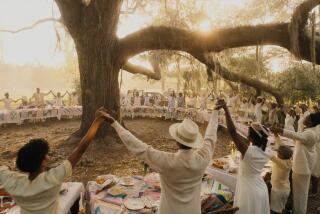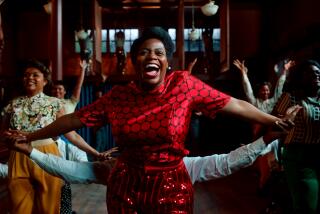Review: In the Kenyan lesbian romance ‘Rafiki,’ a vibrant visual style meets a familiar tale
If ever there were a cinematic equivalent of “purple prose,” the Kenyan director Wanuri Kahiu finds it. Vibrant shades of purple and pink pop into nearly every frame of her new movie, “Rafiki,” a lovely and affecting tale of forbidden desire.
There are the lovely pastel-hued braids worn by a young woman named Ziki (Sheila Munyiva), and also the flowers growing over an abandoned van that becomes a refuge for her and her girlfriend, Kena (Samantha Mugatsia). Even the pastor at Ziki and Kena’s church wears a purple shirt as he preaches to a community that will show its own truer, uglier colors before the movie ends.
The effect of Kahiu’s style — given a striking assist by Arya Lalloo’s production design and Christopher Wessels’ cinematography — is to cast a bright, accessible sheen over an earnest and fairly predictable narrative. It begins with the tentative stirrings and blissful consummation of first love, then proceeds swiftly to the discovery and retaliation of a scandalized community. The familiarity of this story, of course, is also a sign of its ongoing relevance. Last year, shortly before “Rafiki” became the first Kenyan movie to screen at the Cannes Film Festival, it was banned from release in its own country, where homosexuality is illegal.
The ban was eventually lifted for seven days so that the movie could play theaters and qualify for Academy Awards consideration. Here in the U.S., the only ban it faces is the lack of awareness that greets almost every non-English-language release without a major star attached. Perhaps you think you’ve seen this particular movie before, possibly told with more dexterity and finesse. But to merely describe what happens in “Rafiki” would be to overlook its transporting sense of place, its striking visual pleasures and its credible and moving performances.
RELATED: Kenyan director Wanuri Kahiu on her once-banned film ‘Rafiki’ »

Adapted by Kahiu and Jenna Bass from a short story by the Ugandan writer Monica Arac de Nyeko, the movie follows the perspective of Kena, a smart, unassuming Nairobi teenager who dreams of a medical career and spends her free time hanging out and playing ball with the boys in her neighborhood. One of them, Blacksta (Neville Misati), makes playful romantic overtures nearly every time they meet up, though Kena already has other ideas, and people, in mind.
When she locks glances with the outgoing and vivacious Ziki, first seen dancing outdoors with her friends, Kena is immediately and thoroughly smitten. The feelings turn out to be mutual, if far from easily expressed. The criminalization of same-sex love isn’t the only barrier standing in their way. Kena’s father, a shopkeeper (Jimmi Gathu), is running for office against Ziki’s father (Dennis Musyoka), who has greater wealth and name recognition on his side.
These warring political factions are not exactly Capulets and Montagues, though the result is much the same: Ziki and Kena set tongues a-wagging if they do so much as have a drink together in public, let alone kiss or lock arms. (“Rafiki” means “friend” in Swahili, and is a common LGBT euphemism for a significant other.) But the two find their glorious moments of private freedom, and Kahiu shoots them with unabashed lyricism, following the couple from a glow-in-the-dark nightclub where they hit the dance floor to a candlelit hideaway where they make love for the first time.
Kahiu keeps the camera moving and the emotions in flux, especially once the truth comes to light. She draws out the pointed differences between Kena’s mother, a devout Christian with a talent for moral indignation, and her more understanding father, who knows something of what it means to be an outcast.
Kena, for her part, initially seems more scared than Ziki about the prospect of their discovery, but she may well prove to be the more resilient of the two in the long run. That has something to do with class and privilege, as evidenced by Ziki’s dependency on her family, and also something to do with Kena’s self-sufficiency, signaled by the growing determination in Mugatsia’s eyes.
From the kids hula-hooping in the streets to the vile neighborhood gossips who do their part to hasten the story, “Rafiki” squeezes so much pulsing, teeming life into the frame that it’s a shame the movie ultimately feels so abbreviated. The coda, in particular, is touching without being especially satisfying, in part because it builds to a gesture that can’t help but play like a coy cliché. It’s a misstep for a movie with an otherwise remarkable ability to make even its most conventional moments feel bracingly new.
------------
‘Rafiki’
(In English and Swahili with English subtitles)
(Not rated)
Running time: 1 hour, 23 minutes
Playing: Laemmle Glendale, Glendale, and Laemmle Royal, West Los Angeles
[email protected] | Twitter: @JustinCChang
More to Read
Only good movies
Get the Indie Focus newsletter, Mark Olsen's weekly guide to the world of cinema.
You may occasionally receive promotional content from the Los Angeles Times.











